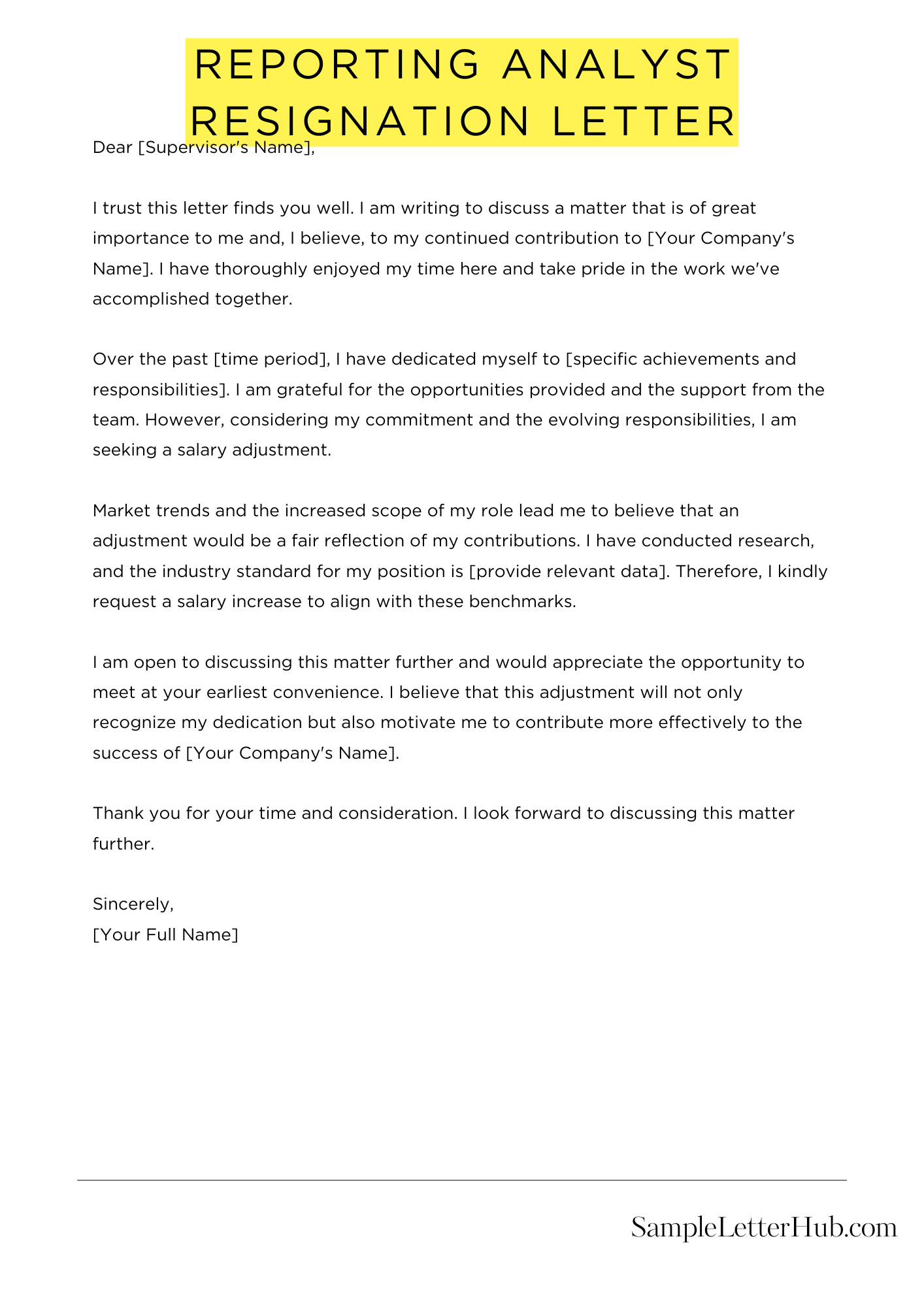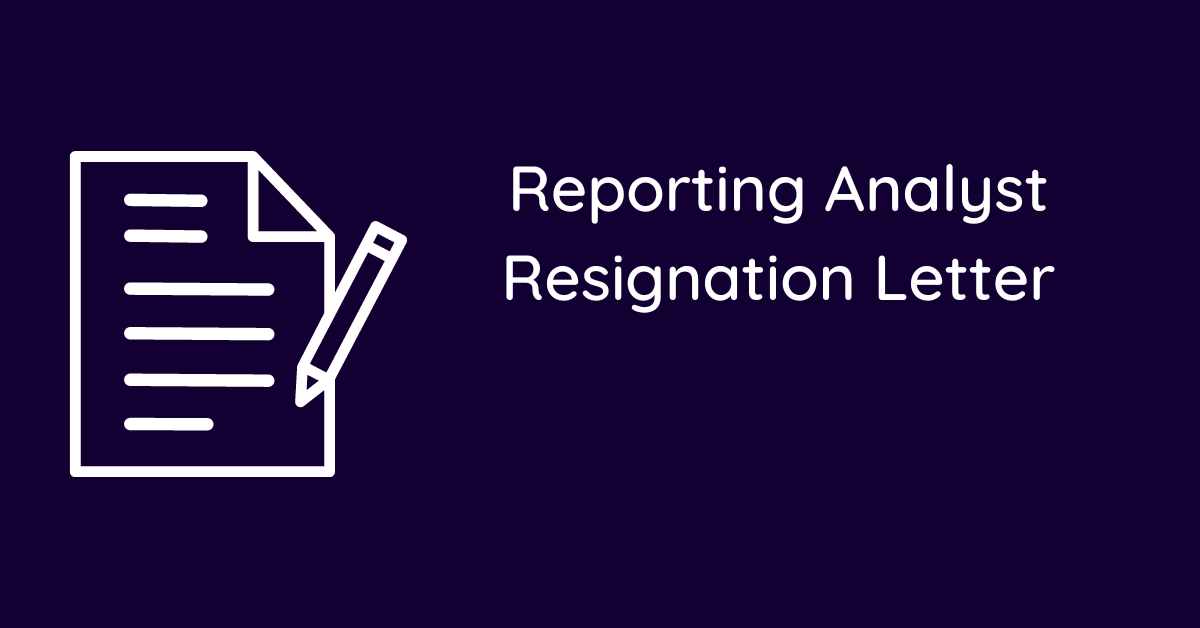Hey there, Reporting Analysts!
If you’re thinking about moving on from your current role, you’ll need to write a reporting analyst resignation letter. Don’t worry, we’ve got you covered. We’ll share an example of a reporting analyst resignation letter with you in this article.
When writing your resignation letter, it’s important to be polite and humble. Remember, you want to leave a good impression on your employer. Even though you’re moving on, you never know when you might cross paths again. So, keep it professional and positive.
Below, we’ve included a template/example reporting analyst resignation letter that you can use. Feel free to adapt it to your own situation. Just remember to be clear and concise in your explanation for leaving. And don’t forget to give your employer plenty of notice.
Reporting Analyst Resignation Letter
Dear [Recipient Name],
Please accept this letter as formal notification that I will be resigning from my position as Reporting Analyst, effective [last date of employment].
I have enjoyed my time at [Company Name] and am grateful for the opportunities and experiences I have gained during my tenure. I have learned a great deal and have developed valuable skills that will serve me well in my future endeavors.
I wish you and [Company Name] all the best in the future.
Sincerely,
[Your Signature]
Short Reporting Analyst Resignation Letter Sample
Please accept this letter as formal notification that I am resigning from my position as Reporting Analyst at [Company Name]. My last day of employment will be [Your Last Day]. Thank you for the opportunity to grow and learn during my time here. I wish you and the company continued success. I am happy to assist in the transition process to ensure a smooth handover of my responsibilities.
I wish you all the best with your reporting analyst resignation letter.
When it’s time to say farewell, expressing your gratitude and best wishes can make the transition smoother:

How to Write a Reporting Analyst Resignation Letter
Writing a resignation letter can be a daunting task, especially when you’re a reporting analyst. You want to express your gratitude for the opportunity, while also making it clear that you’re moving on to bigger and better things.
1. Start with a Formal Salutation
Begin your letter with a formal salutation, such as “Dear [Manager’s Name].” This shows respect for your manager and the company.
2. Express Your Gratitude
In the first paragraph, express your gratitude for the opportunity to work as a reporting analyst at the company. Mention specific experiences or projects that you’re particularly grateful for.
3. State Your Decision to Resign
In the second paragraph, clearly state your decision to resign from your position. Include your last date of employment.
4. Offer to Help with the Transition
In the third paragraph, offer to help with the transition during your notice period. This could include training your replacement or completing any outstanding projects.
5. End with a Positive Note
End your letter with a positive note, expressing your best wishes for the company’s future success. You can also mention that you’re open to staying in touch in the future.
Reporting Analyst Resignation Letter: 6 FAQs
When it comes to resigning from your position as a reporting analyst, there are certain formalities and etiquette that should be followed. Here are some of the most frequently asked questions and answers on the topic:
1. What should I include in my resignation letter?
Your resignation letter should include the following information:
- Your name and contact information
- The date
- The name of the company and the person you are addressing
- A clear statement of your resignation
- Your last date of employment
- A brief expression of gratitude for the opportunity to work at the company
2. How should I format my resignation letter?
Your resignation letter should be formatted in a professional and concise manner. Use a standard font and font size, and left-align your text. Keep your letter to one page, and be sure to proofread it carefully before submitting it.
3. When should I submit my resignation letter?
It is generally advisable to submit your resignation letter two weeks before your last date of employment. This will give your employer ample time to find a replacement. However, if you are leaving on short notice, you may need to adjust the timing of your resignation letter accordingly.
4. What should I do if I am asked to stay?
If your employer asks you to stay, it is important to be polite and professional. Thank them for their offer, but reiterate your decision to resign. You can also offer to help with the transition in any way that you can.
5. What if I have any outstanding projects?
If you have any outstanding projects when you resign, it is important to make arrangements to complete them before you leave. This may involve working with your colleagues to delegate tasks or providing documentation on your work.
6. Can I use a template for my resignation letter?
There are many templates available online that you can use for your resignation letter. However, it is important to personalize the letter to reflect your own circumstances. Be sure to include all of the necessary information, and proofread your letter carefully before submitting it.
Before making the decision to resign from your job, it’s essential to consider the legal aspects:
Understanding your emotions after quitting your job is important. Explore why you might be feeling sad:
Related
- Resignation letter sample
- Forced resignation letter
- Resignation letter due to going abroad
- Resignation letter due to marriage
- Resignation letter due to other opportunity
- Resignation letter due to mistake

